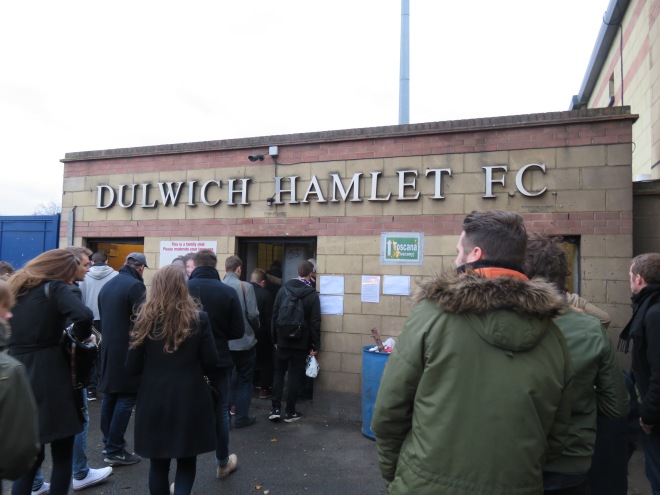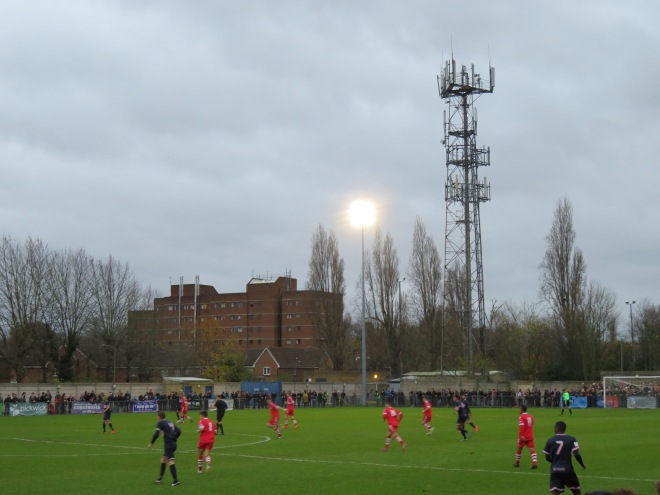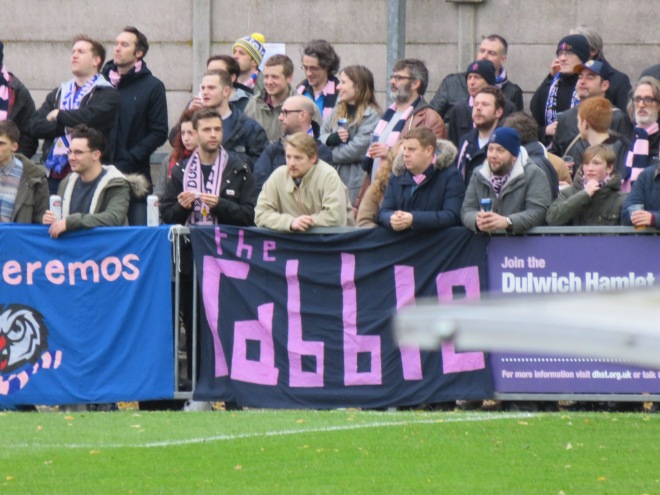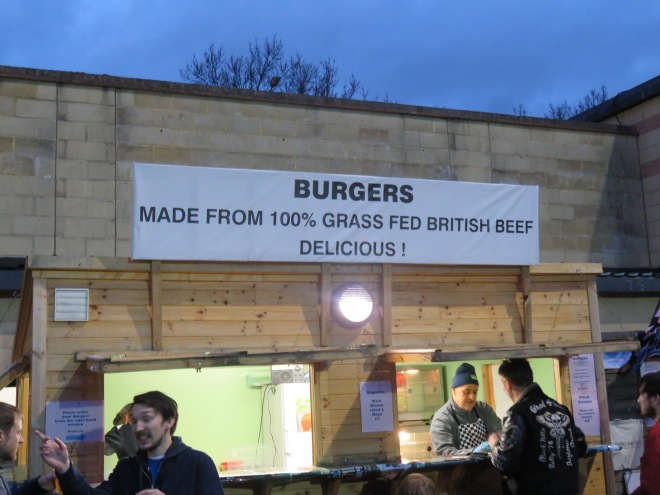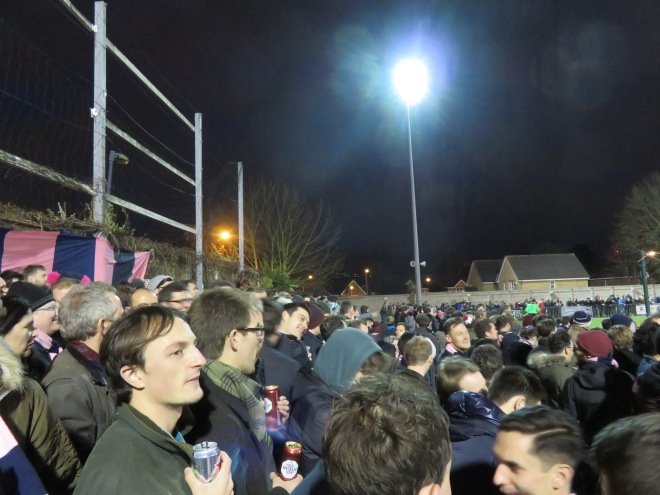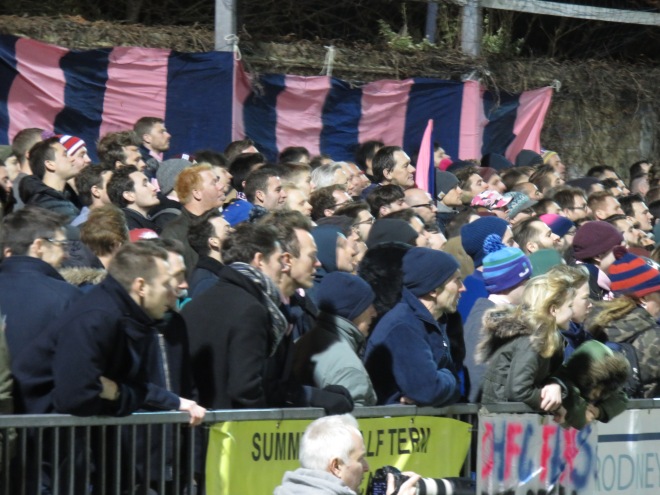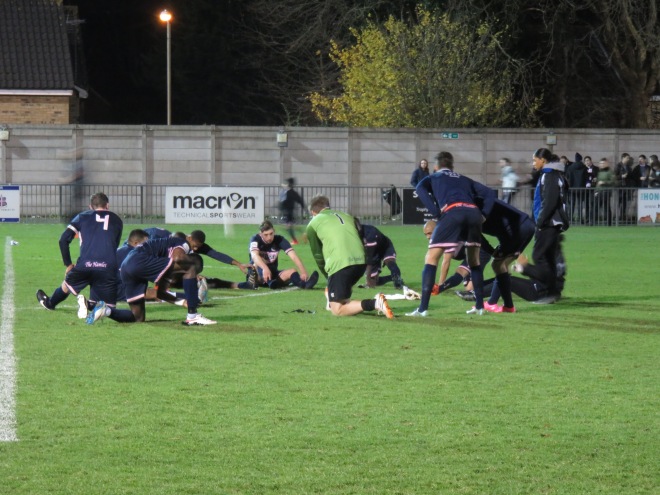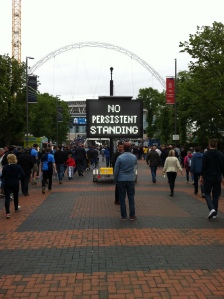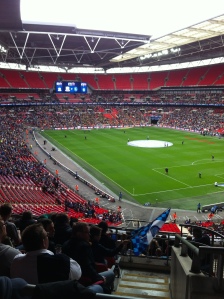The game: Enfield Town v. Dulwich Hamlet.
The ground: the QEII.
The conditions: windier than myself after a mung bean salad (with extra lentils).
Easter weekend is a time of reflection. It is a time of profound religiosity. A time to think about our many and varied sins, while eating lots of chocolate and sending unwarranted abuse to the people who run Cadbury’s official Twitter account.
However, most importantly of all, it’s also a ruddy good time to catch up on non-league football. With work commitments suspended for four whole days, I found myself with time on my hands come Saturday afternoon.
And how did I spend that time? I spent it watching Enfield Town take on Dulwich Hamlet, obviously.
Both Town and Hamlet have suffered mixed fortunes of late. While the Pink & Blues were top of the league at Christmas, mixed form (and too many draws, in particular) had seen them drop down to fifth ahead of the big game at the QEII. Town, after a strong run in the mid-season, had also stuttered in their previous few fixtures.
As such, the two teams were now in direct contention for a play-off berth. The pre-match tension was heightened accordingly.
Ignoring the pre-match tension, I rocked up in EN1 and immediately trotted up to the Butler’s Bar for a pint of Redemption pale ale. By kick off, the ground had filled out nicely. Home and away fans had assumed their positions at opposite ends of the pitch. The dulcet parps of a local brass band filled the air. The stage had been set for the heady melodrama that is – the football!
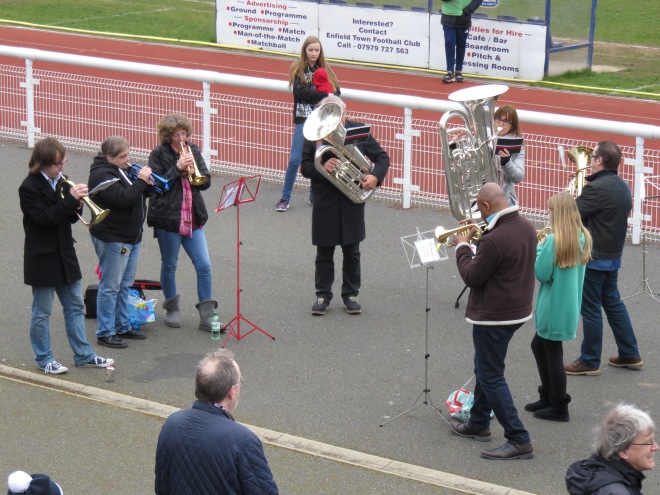
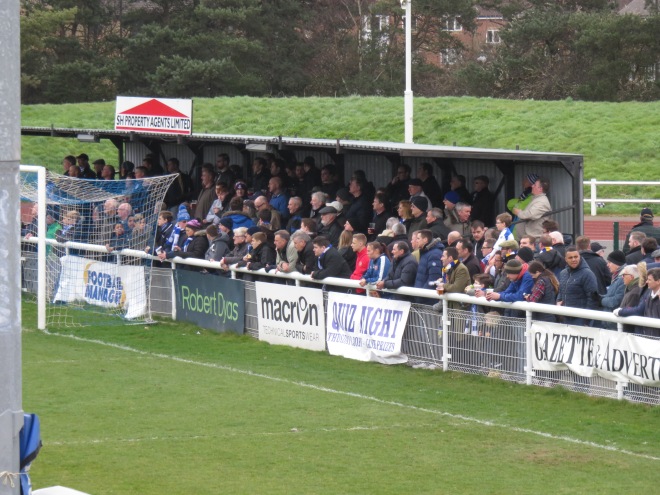
With both sides preferring to play a clever, passing game, the wet and windy conditions didn’t really favour anyone. Nonetheless, it was Enfield that started by far the brighter of the two sides. With five minutes on the clock, Tyler Campbell broke away down the right before teeing up Corey Whitely in the middle of the box; his effort was well blocked by Ethan Pinnock. A half chance for Stanley Muguo came a few minutes later, but he could only shank a shot into the arms of Hamlet keeper Preston Edwards from the edge of the box.
Near the fifteen minute mark, Town carved out the first clear-cut opportunity of the match. The effervescent Whitely got in behind Hamlet’s defence and galloped toward goal from the left. With Dulwich defenders sprinting back to catch him, he clipped a beautiful cross straight to Bobby Devyne. Unfortunately, his strike partner could only blast over the crossbar from eight yards. Hands on heads for Town.
That sense of frustration only grew when, just over ten minutes later, the visitors went ahead. A scrappy period had seen the game level out a little, before Dulwich suddenly broke forward in numbers. A Nyren Clunis cross from the right bobbled in the box before falling for Jack Dixon, who rifled low into the corner of the net. The travelling Hamlet fans went wild.
Moments afterward, that elation turned sour. Having picked up a yellow card for handball early on, Hamlet defender Matt Drage was caught dawdling on the ball by Campbell. Sticking out a leg, Drage brought his opponent down right in front of his own box. The second yellow was inevitable. Hamlet were down to ten.
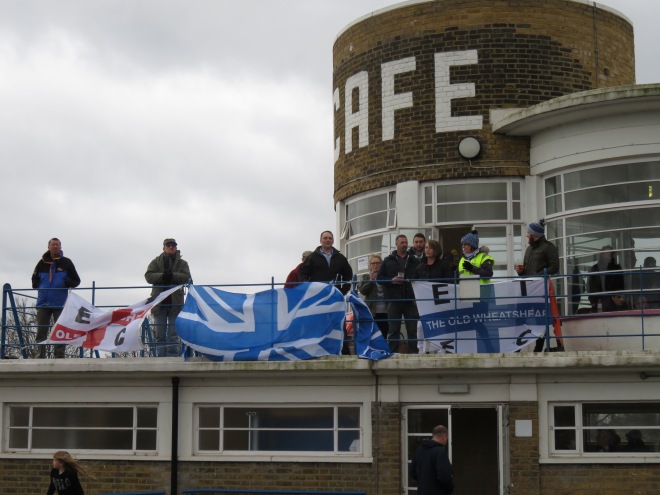
Despite all this sudden drama, the rest of the half was fairly subdued. The best chance fell for Hamlet’s new signing (and debutant) Dipo Akinyemi just before half time; after a strong run into the box he opened up his body and fired a yard past the far post. Soon enough, the whistle went.
The Butler’s Bar was out of Redemption, so I had to have a Fosters. Ugh.
Back to the game, and it didn’t take long for ten-man Hamlet to forfeit their narrow lead. Two minutes after the restart, an Enfield corner came straight to Mark Kirby only a few yards out. He couldn’t miss.
While the home end exploded into jubilant celebration, the Rabble didn’t even break song. That clearly steeled the team because, much like their supporters, they refused to be cowed by the setback.
In fact, despite their one-man deficit, it was Hamlet who were to score next.
In the fifty-fifth minute, Akinyemi controlled a long ball in the middle of the park before sending Clunis away down the right wing. Sprinting past his markers, Nyren pinged a floated ball to the back post where – having made up the ground in no time – Dipo was on hand to nod home.
It was 2-1 to Dulwich and, though chants of “Nyren Clunis, makes Messi look shite” were fully justified, Akinyemi deserved a hefty chunk of praise for his all-action role in the goal. Now, Gavin Rose’s men just had to hang on.
Enfield had other ideas, however.
The home pressure built from that point onward, while the depleted visitors looked increasingly stretched at the back. In the sixty-third minute, after Jordan Hibbert gave away a clumsy foul just outside the Hamlet area, Whitely’s curling free kick hit the bottom of the post. Five minutes later, Edwards was forced into a double save from Tyler Campbell and Bobby Devyne respectively. The latter’s shot came from barely a yard out – the visiting keeper deserved huge credit for his efforts.
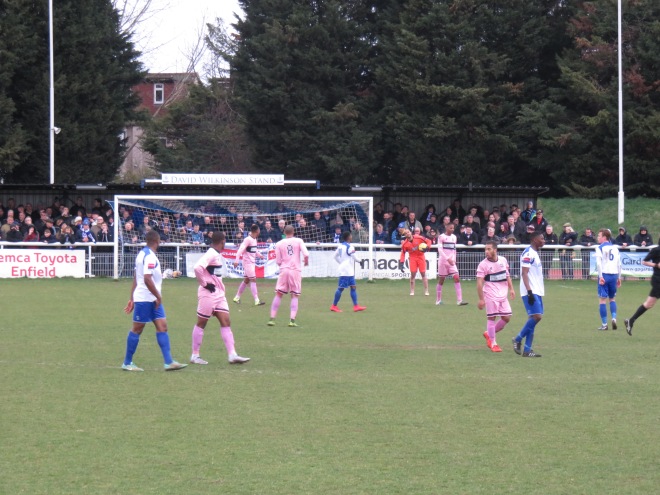
A string of saves from Edwards was the only thing which kept Hamlet ahead after that. In the seventieth minute, Devyne ran at Hamlet’s centre backs before unleashing Whitely to the left of the box; his fierce effort was smothered and saved. Two minutes later, Hamlet old boy Harry Ottaway sent a looping header towards the top corner – only for Edwards to pluck it out of the air like a parakeet swooping for a juicy ladybird.
On the eightieth minute mark, Devyne had a gilt-edged chance to equalise when he capitalised on a defensive mistake by Dulwich and went clear through. He fired wide with the goal gaping.
Two minutes later, though, Hamlet were finally breached. Another defensive mistake saw Edwards come early for a loose ball. Whitely got there first, skipped around the keeper and slotted a cool finish low into the net. Could Enfield kick on and win it?

The answer, in short, was: no. Though Edwards palmed away a vicious Whitely shot in the eighty-ninth minute, the game was relatively calm for the final stretch. With rain now coming down in sheets and both sides exhausted from their exertions, the players seemed fairly satisfied with the scoreline. The final whistle went.
Though Town fans might be disappointed not to have nabbed all three points when facing ten men, the draw was a fair result in the end. Entertaining despite the conditions, full of fighting spirit and with plenty of quality on show, the game was a good measure of the two teams at this point in the season.
Will Town and Hamlet meet once more in the play offs? I can only hope.
Result: Enfield Town 2 Dulwich Hamlet 2.
My MoM: Corey Whitely is surely one of the most dangerous players in the division, but Nyren Clunis was similarly excellent on the day. Two assists for Clunis edge him narrowly ahead.
Best fans: Both sang all afternoon, both braved wind and rain to support the sides. I’m not going to choose between them, and you can’t make me.

